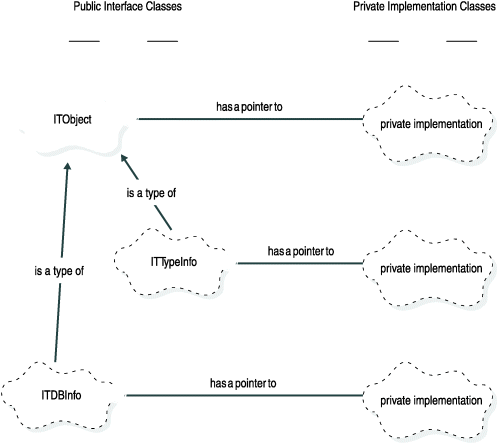Operation classes
applications create instances of public operation classes, which contain pointers to private implementation classes.
Although this interface/implementation approach adds an extra level
of indirection, it provides important benefits:
- Applications do not depend on the implementation of the underlying class because the implementation class is inaccessible.
- Performance of copy operations is improved because applications copy only the implementation pointer of the object and not the entire object.
- Applications can easily use automatic variables as opposed to heap-allocated variables. Automatic variables are automatically deallocated when they pass out of scope, which helps avoid memory leaks. The implementation class tracks references to objects, removing objects only when they are no longer referenced.
The following figure illustrates the relationship between the public
interface classes and private implementation classes. Figure 1: Public interface and private implementation
of operation classes


The Object Interface for C++ defines
the following operation classes.
| Operation class | Description | See |
|---|---|---|
| ITConnection | Manages a database connection. | The ITConnection class |
| ITConnectionStamp | Maintains stamp information about a connection. | The ITConnectionStamp class |
| ITContainerIter | Extracts C++ base-type values (such as int, long, or double) from a container value object. | The ITContainerIter class |
| ITCursor | Defines cursors and manages results. | The ITCursor class |
| ITDBInfo | Stores database information. | The ITDBInfo class |
| ITDBNameList | Allows the user to obtain database names. | The ITDBNameList class |
| ITErrorManager | Provides base class functionality for managing error callbacks. | The ITErrorManager class |
| ITFactoryList | Adds mappings from HCL Informix® data types to functions that build value objects to represent instances of these data types. | The ITFactoryList class |
| ITInt8 | Provides an 8-byte integer class. | The ITInt8 class |
| ITLargeObjectManager | Supports large objects. | The ITLargeObjectManager class |
| ITLocale | Provides GLS support. | Online notes |
| ITMVDesc | Not an operation class, but a descriptor that holds the instance information necessary to create a value object. | The ITMVDesc class |
| ITObject | Provides the base class for public operation class interface objects. | The ITObject class |
| ITPreserveData | Provides an interface for maintaining a reference to database data received from the server, for use by the implementer of a value object. | The ITPreserveData class |
| ITQuery | Issues SQL queries to the HCL Informix database. | The ITQuery class |
| ITRoutineManager | Provides fast path execution of DataBlade® API functions. | The ITRoutineManager class |
| ITStatement | Provides support for the execution of prepared queries that return no rows. | The ITStatement class |
| ITString | Provides a string class. | The ITString class |
| ITSystemNameList | Allows the user to obtain host system names. | The ITSystemNameList class |
| ITTypeInfo | Stores information about database types. | The ITTypeInfo class |
For detailed descriptions of these operation classes, see Operation class reference.